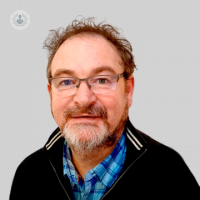ADHD in children: Your questions answered
Written by:ADHD (attention deficit hyperactivity disorder) is a condition characterised by a persistent pattern of behavioural symptoms that affect daily functioning and development.
Here, Dr Anthony Crabb, consultant child and adolescent psychiatrist, provides a comprehensive insight into ADHD in children, discussing symptoms and treatments among other important points.

What are the common signs and symptoms of ADHD in children?
The symptoms of ADHD in children typically fall into two main categories: inattention and hyperactivity-impulsivity.
The main signs of inattention include:
- difficulty concentrating and focusing
- making careless mistakes, for example with one’s schoolwork
- difficulty organising tasks
- avoiding tasks that require sustained mental effort
- forgetting or losing items
The main signs of hyperactivity and impulsivity include:
- fidgeting or tapping one’s hands or feet
- being unable to sit still or seated for long periods of time
- talking excessively
- interrupting or intruding on conversations
- difficulty waiting one’s turn
- answering before questions are completed
- being overly active
ADHD symptoms become noticeable during early childhood, usually before the age of 6.
It is important to know, however, that not all children with ADHD may exhibit all of the characteristic symptoms, and the severity of the symptoms may also vary in itself. Additionally, symptoms can change as a child grows into adulthood.
How is ADHD in children diagnosed, and what assessments or evaluations are involved?
In the UK, diagnosing ADHD in children involves a comprehensive and detailed assessment conducted by a qualified mental health specialist, such as a psychiatrist or clinical psychologist.
The diagnostic process generally includes the following components:
- A series of interviews: The specialist conducts an interview with the child and their parents, focusing on the child’s clinical history, signs and symptoms, as well as any family history of ADHD or other mental health conditions. The child’s teachers may also be interviewed.
- A period of observation: The specialist may observe the child’s behaviour and social interactions in various situations, such as at home and at school, to assess their symptoms and functioning. This can include specific computerised observation such as a QbCheck.
- An educational evaluation: The specialist may evaluate the child’s academic performance and educational history to identify any learning disabilities or additional needs related to ADHD.
- A physical examination: A physical examination may be recommended to rule out any underlying medical conditions that might mimic or contribute to the symptoms of ADHD.
- A series of rating scales: ADHD-specific rating scales and questionnaires, which are completed by the child’s parents and teachers, are often used to assess the child’s symptoms.
- Psychological testing: In some cases, psychological testing may be used to assess cognitive functioning and emotional wellbeing, helping to identify any co-occurring mental health conditions that may be present alongside ADHD, such as anxiety.
It is important to know that the assessment process may take time to complete. To receive a formal diagnosis of ADHD, symptoms should be present for at least six months and significantly affect a child’s daily life.
What treatments and interventions are available for ADHD in children?
The treatment of ADHD in children involves a multimodal approach that combines various therapeutic approaches and interventions which are tailored to the child’s specific needs.
Common treatments and interventions include:
- Ensuring environmental changes that can be made are maximised. Maintaining good nutrition, sleep and exercise are all important in helping with ADHD symptoms.
- Psychoeducation: Families are provided with mental health resources about ADHD and its effect on daily life to help them better understand the condition and create a structured and supportive environment for their child.
- Cognitive behavioural therapy (CBT): CBT provides children and parents with effective coping strategies, behaviour management, and problem-solving skills to better manage ADHD symptoms.
- Academic support: Teachers and educational professionals can make accommodations to support children with ADHD in the classroom. This may include providing additional contact hours, adjusting assignments, or developing a specialised educational plan.
- Therapy: Children and their parents may benefit from one-to-one therapy, group therapy, or counselling to address mental health issues associated with ADHD, helping improve aspects such as self-esteem and social skills. Likewise, occupational therapy can help children to develop efficient fine and gross motor skills to improve their organisational abilities.
- Medication: In some cases, medication may be prescribed to manage ADHD symptoms.
Working with qualified and trained mental health specialists who specialise in ADHD in children is essential to provide the best support and care.
What is the role of medication in treating ADHD in children, and when is it indicated?
Medication may be considered when ADHD symptoms are severe, pervasive, and have a significant impact on the child's functioning at home and at school.
In the UK, there are five types of medicines licensed for the treatment of ADHD in children, including methylphenidate, lisdexamfetamine, dexamfetamine, atomoxetine and guanfacine. These are typically started at a low dose and adjusted as needed to achieve the best balance between symptom control and manageable side effects. Regular monitoring is essential to ensure that the medication is effective, safe, and well-tolerated.
Medication is highly effective in treating the core symptoms of ADHD, helping children to concentrate better, improve their focus, and be less impulsive. However, medication is not a permanent cure. The decision to prescribe medication should always be made carefully, considering the child’s individual needs, and it should always be part of a wider comprehensive care plan that also includes psychoeducation and cognitive and behavioural therapy.
Dr Anthony Crabb is a consultant child and adolescent psychiatrist with 15 years of experience at consultant level.
If you require expert assessment, diagnosis and treatment for ADHD, don’t hesitate to book an appointment with Dr Crabb via his Top Doctors profile today.


